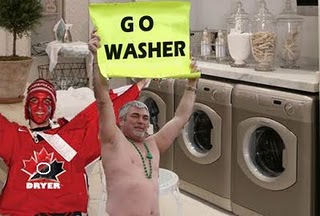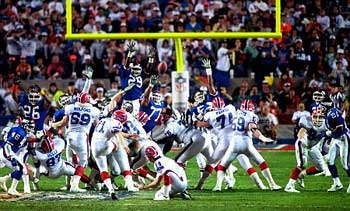 After a four-month labor standoff, the NFL owners and players managed to agree to a new ten-year agreement that will guarantee the season will start on time. For me, that means the Buffalo Bills will open their 52nd season on September 11. In fact, as I finish this piece, the Bills are in Chicago getting ready for their first preseason game tonight. I can hardly wait.
After a four-month labor standoff, the NFL owners and players managed to agree to a new ten-year agreement that will guarantee the season will start on time. For me, that means the Buffalo Bills will open their 52nd season on September 11. In fact, as I finish this piece, the Bills are in Chicago getting ready for their first preseason game tonight. I can hardly wait.
Yes, I am excited to see the latest season of a team that finished 4-12 last year, and that has had one winning season (and two 8-8 records) since 2000.
The team that last went to the playoffs during the Clinton administration—only to be robbed of victory by a heartbreaking piece of semi-legal deception known to people outside of Western New York as “Home Run Throwback.”
[People in Western New York know it by a variety of other names, none of them suitable for this family website…]
Yes, the same team that went to four consecutive Super Bowls in the early 90s—losing the first one on an achingly close field goal attempt (videos of which I admit to watching many times, hoping for a different result), then the next three in different but equally painful manners.
But also the team that mounted the single greatest comeback in the history of the NFL, overcoming a thirty-two-point deficit in the second half of a 1993 playoff game.
As a college professor, there are plenty of people in my profession who view an attachment to sports with bemused contempt. Being a self-defined intellectual requires a bit of self-awareness, and a realization that there is something not quite sensible about paying attention to the activities of genetically blessed multimillionaire strangers in Halloween costumes playing children’s games.
So why be a sports fan? One argument is that world-class athletics offer the same kind of aesthetic pleasure that ballet, or any other art form can provide. Unnecessary in themselves, they offer a reminder of the beauty of human potential, a brief glimpse into the sublime possibilities of human action.
But is that really enough? I don’t think so. A team represents a tangible link to a time and place, and even the most ugly representative is beautiful because of that connection. This works as well for those still living in the place, but it can be even more powerful for expatriates, all linked by a commitment to a color, a symbol, a team.
 Cynics call this “rooting for the laundry” since the focus is on the uniform rather than the individual wearing it at any one time. For me, though, it means that when cheering for the Bills I am cheering not only for the players who happen to occupy the uniforms, but for Buffalo, for Western New York, for the friends and family back there and scattered around the world. Like the team, Western New York is a region that has suffered its share of bad breaks and setbacks over the past few decades, one that is dismissed by many outsiders as a loser, irrelevant to larger developments in the country. The lack of success is frustrating, but it also deepens the emotional tie. I sometimes wonder what it must be like to grow up a fan of a perennial winner in some major sport—the Yankees, or Cowboys, Steelers, Canadiens—but I can no more transfer my loyalties than I could change my parents. Of course I want the Bills to win, but that does not mean I can abandon them when they lose; that would break faith with that vast invisible community of friends, family, and fans.
Cynics call this “rooting for the laundry” since the focus is on the uniform rather than the individual wearing it at any one time. For me, though, it means that when cheering for the Bills I am cheering not only for the players who happen to occupy the uniforms, but for Buffalo, for Western New York, for the friends and family back there and scattered around the world. Like the team, Western New York is a region that has suffered its share of bad breaks and setbacks over the past few decades, one that is dismissed by many outsiders as a loser, irrelevant to larger developments in the country. The lack of success is frustrating, but it also deepens the emotional tie. I sometimes wonder what it must be like to grow up a fan of a perennial winner in some major sport—the Yankees, or Cowboys, Steelers, Canadiens—but I can no more transfer my loyalties than I could change my parents. Of course I want the Bills to win, but that does not mean I can abandon them when they lose; that would break faith with that vast invisible community of friends, family, and fans.
Such a view of sports has its pitfalls. The comings and goings of the players, and the immense sums generated and spent by the teams, rely on the devotion of fans who will never in their lives earn as much as some players will make in a season, let alone the owners. Indeed, when examined too closely, the working stiffs who spend their limited disposable income on tickets, or who purchase the paraphernalia of a team, or even who patronize the sponsors of the games on television, are engaged in a massive transfer of wealth from the poor to the rich. They spend all their money, and all they get is a lousy T-shirt, along with fleeting moments of elation when things go well, and the crushing experience of loss when they do not. This all depends on a tacit agreement between the fans on one side and the players, owners, and league officials on the other. Sensible fans know that the whole business is mercenary. All they ask is that the producers of sport not rub their noses in that reality, not force them to realize that their emotions and their symbolic attachments are also so many hooks used to take money out of their pockets. The recent labor dispute stretched this tacit agreement to the breaking point, and it remains to be seen whether the old relationship will be restored.
But it is that non-rational, emotional connection that invests sporting events with meaning—at least for those non-gamblers among us…. It is probably healthy to have something about which one can care deeply but which does not really matter. You win, you feel great until the next game; you lose, you feel awful, until the next game. It neither picks your pocket nor breaks your leg, but it provides a welcome distraction from the real cares of the here and now. The moment of celebration is sublime, even if it is also false and superficial. It is a lie, but a beautiful lie, and we all need beautiful lies now and then. There will be plenty of time for ugly truths later.
 So, I see no problem with rooting for the laundry. Indeed, for someone who has never played sports at the highest levels, there is no other reason for me to pay any attention at all to the individual athletes. They will come and go, but the team will (hopefully) remain (Bills fans live in the dread realization that the team could someday move on to greener pastures), to continue to play its role as the repository of symbolic meaning, and as a bond that links fans to each other wherever they may be. It is that deeper connection that had me bowing my head in prayer at the bar in Jimmy’s Woodlawn Tap on 55th street in Chicago on a January evening in 1991 when Scott Norwood lined up for that kick, and that had me sitting in an apartment in Cologne Germany long after midnight in January 1994, my ear close to the speaker on my radio as I listened to the faint AFN broadcast of Thurman Thomas fumbling away a last chance at glory. It has kept me cheering and suffering for the past thirty-five years.
So, I see no problem with rooting for the laundry. Indeed, for someone who has never played sports at the highest levels, there is no other reason for me to pay any attention at all to the individual athletes. They will come and go, but the team will (hopefully) remain (Bills fans live in the dread realization that the team could someday move on to greener pastures), to continue to play its role as the repository of symbolic meaning, and as a bond that links fans to each other wherever they may be. It is that deeper connection that had me bowing my head in prayer at the bar in Jimmy’s Woodlawn Tap on 55th street in Chicago on a January evening in 1991 when Scott Norwood lined up for that kick, and that had me sitting in an apartment in Cologne Germany long after midnight in January 1994, my ear close to the speaker on my radio as I listened to the faint AFN broadcast of Thurman Thomas fumbling away a last chance at glory. It has kept me cheering and suffering for the past thirty-five years.
And it will keep me checking the Internet radio feed tonight when the Bills play in Chicago.










Leave a Reply